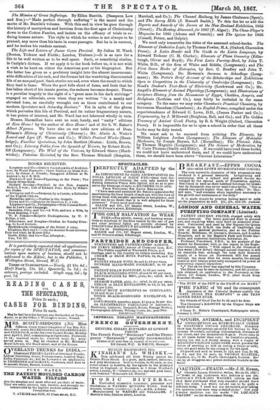The Life and Letters of James Gates Percival. By Julius
H. Ward. (Boston, Ticknor and Fields ; London, Trubner.)—It is as rare for a life to be well written as to be well spent. Such, or something similar, is Carlyle's dictum. If we apply it to the book before us, it is not with a wish to be hard on either the American poet or his biographer. But the latter has given us a prefatory insight into the almost insurmount- able difficulties of his task, and the former led the wandering discontented life of an unequal poet. Such stories are Bad, even when the result to which they lead is fame. When the poet falls short of fame, and feels that he has fallen short of his innate genius, the sadness becomes despair. There is a peculiar tragedy in the sight of a "great man in his dark strivings" engaged on editorials, even when they are written "in a manly and elevated tone, as carefully wrought out as those contributed to our modern Spectators and Saturday Reviews." Yet in spite of the gloom which pervades this life of Percival, and its rather fragmentary nature, it has points of interest, and Mr. Ward has not laboured wholly in vain.
Messrs. Macmillan have sent us neat, handy, and " natty " editions of Ecce Homo! by the author of Ec.42 Homo! and of Sir S. W. Baker's Albert Nyanza. We have also on our table new editions of Dean Milman's History of Christianity (Murray) ; Mr. Atari° A. Watts's Laurel and Lyre (F. Warne and Co.); Willis's Poetical Works (Rout.. ledge); Familiar Quotations, by John Bartlett (Boston : Little, Brown, and Co.); Literary Fables from the Spanish of Yriarte, by Robert Rock- liff (Longmans); The Wail of the Vatican, by Edward Slater (Hard- wicke) ; Palestine Revisited by the Rev. Thomas Mitchell (Simpkin,
Marshall, and Co.); The Channel Railway, by James Chalmers (Span); and The Surrey Hills (J. Russell Smith.) To this list let us add the Reports and Awards of the Jurors at the New Zealand Exhibition, 1865 (Street); The Bombay Abnanack for 1867.(F. Alger); The Chess-Player's Magazine for 1866 (Adams and Francis); and The Quiver for 1866, (Cassell, Petter, and Galpin).
We need only transcribe the titles of the annexed school-books. The Elements of Deductive Logic, by Thomas Fowler, MA. (Oxford, Clarendom Press); A Latin Reader and The Guide to the Latin Language, by Edward Ticknor (C. H. Clarke); Elements of Plane Geometry (Wm- burgh, Oliver and Boyd); The First Latin Parsing-Book, by John T.. White, D.D., of the firm of White and Riddle, (Longmans); and The First Seven Books of Eutropius, by Rev. C. Bradley and John T. White (Longmans). Dr. Howson's Sermons to Schoolboys (Long- mans) ; Mr. Potts's Brief Account of the Scholarships and Exhibitions Open to Competition in the University of Cambridge (Longmans); Dr. Need's Student's Text-Book of Electricity (Lockwood and Co.); Mr. Angell's Elements of Animal Physiology (Longmans); and Illustrations of Scripture History from the Monuments of Egypt, Chaldoea, Assyria, and Babylonia (Lothian and Co.), may fairly be included in the same category. To the same we may refer Chambers's Practical Chemistry, by Stevenson Macadam (Chambers); An English Primer, compiled under the superintendence of Edward C. Lowe, DD., (James Parker and Co.); Trigonometry, by J. M'Dowell (Deighton, Bell, and Co.); and The Golden Treasury of Ancient Greek Poetry, by R. S. Wright (Oxford, Clarendon Press). It is impossible for us to open a school in order that all these, books may be duly tested.
We must ask to be excused from noticing The Elements, by William Leighton Jordan (Longmans); The Elements of Molecular Mechanics, by Joseph Bayma, S.J. (Macmillan); The Platonic Idea, by Thomas Maguire (Longmans); and The Science of Moderation, by W. Cave Thomas (Smith and Elder). If we could have read these books, we could not have understood them, and if we could have understood them, we should have been above "Current Literature."


































 Previous page
Previous page